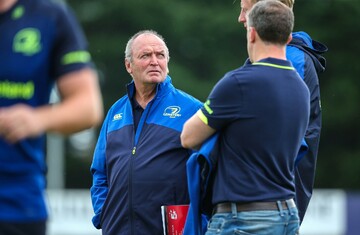WITH GPS TRACKERS in place, a well-measured basket of recovery food and drink by the sideline and drones hovering overhead to record every shape and re-shape; Leinster trained in Greystones today with a valuable piece of 70-year-old technology to complement the new.
Graham Henry walked silently behind the play, man-marking Girvan Dempsey for a time, switching to Leo Cullen later and stood well back while the entire training squad huddled together before dispersing to satisfy the summer holiday autograph hunters.
When shaking hands, Henry is quick to shrug off his knighthood. Graham will do, Ted feels overfamiliar, but maybe not to the Kiwi. The important thing is improving Leinster’s performance by ensuring the inexperienced coaching staff get a steer – either to underline where they’re going right, or giving advice on what he would do differently.
The secondary aim is improving the players’ habits and patterns.
“It’s an old cliché that you do the basics well and the rest will fall in to place,” Henry says in the middle of the Dr Hickey Park pitch, perhaps still feeling the effects of jet-lag after his weekend arrival.
The catch-pass is very important. Not running along the pass, but running into the pass. Running straight lines, passing across the body. You fix defenders and you’re not running at 35 or 45 degree angle. I think that’s a very important part of the game.
“I think if they can improve that particular skill they’ll get better results and score more tries.”
Scoring tries is a common reminder Henry has issued to teams who’ve called for his services. Since leaving the All Blacks in the tickertape glory of a World Cup win in Auckland he went to Argentina to set them on a path to the brilliant rugby they played last year
“The game is about scoring tries,” he says of his time with the Pumas.
“Every time you’re in a situation – a set-piece, breakdown or maul – you’re saying: ‘how can we score from here?’
“If you’re always saying: ‘how can we score tries from here?’ I think that’s a pretty good mentality. And when they’ve got the ball: ‘how do you stop them scoring so you can get it back and score?’
“The Argentinian mentality, I think, was not to lose by too many points. A forward orientated game with a flat back-line whose job was to knock people over. So they’ve changed.”
Changing Leinster’s ethos might not be such a dramatic shift. Though putting the province where they want to be as distinct from where they too often ended up in big games last season would be a job extremely well done from Henry, Cullen and his back-room team.
Outside in
“I think they create opportunities without knowing they’ve created the opportunity,” says the Christchurch man, outlining more of what he’d like to see implemented.
“Recognising the opportunity’s there, setting a structure to take advantage of that…
“And more communication from the outside in: the guys on the outside can see things happening and they need to communicate that information to the playmakers.”
It’s a small window to work within “to make the coaches better” so that Leinster as a team can improve sustainably. Henry, though, has had since May to ponder how he might use his time, and 54 years of coaching experience before that.
The42 is on Snapchat! Tap the button below on your phone to add!









Is the massive bloke from Happy Gilmore walking around taunting him?
Think i heard someone shouting “jackass” a few times at him actually!
Tap tap taparoo…….
You will not make this putt you jackass!
Just tap it in. Just tap it in.